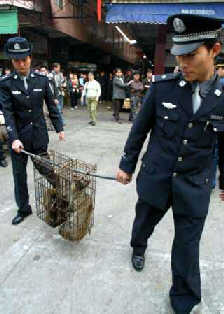Deadline set for civet disposal
( 2004-01-07 00:08) (China Daily)
Provincial officials have set January 10 as the deadline for culling over 10,000 masked palm civets in South China's Guangdong Province.

Two police officers carry confiscated civet cats during a raid at a wild animal market in Guangzhou, South China's Guangdong Province January 5, 2004.[Reuters] |
Processing of the animals is being conducted mainly using high temperature braising and steaming of the seized civets, which has been conducted throughout the province since Monday afternoon. Civets have been announced as being the most probable source of the severe acute respiratory syndrome (SARS) coronavirus, which is in turn pass on to human beings.
However, the World Health Organization (WHO) announced yesterday that it does not advise killing a large number of wild animals as a measure to prevent the spread of SARS.
"The source of infection for newly confirmed case in southern China is not clear now, and no single animal has been identified to be the source," said WHO spokesman Lain Simpson.
A total of 85 civets were going through extermination process on Monday in a sanitation disposal factory, located in the suburban district of Fangcun.
Hundreds of civets received the same treatment yesterday in the factory, which was set up with a special 25-member team working three separate shifts.
"We have shut down 41 civets breeding farms, capturing 2,030 live civets in the province,'' said a source with the Guangdong Provincial Forestry Administration surnamed Chen.
Among them, about half came from the Shaoguan region, in the north of the province.
The rest, accounting for a dominant larger share of about 8,000 were shipped from other provinces, he said.
"We are collaborating with neighbouring provinces to revoke transportation licences for carrying civets to Guangdong,'' he added.
After being captured and gathered, the civets are transported to the factory, awaiting disposal by the team in the factory, who wear protective coats, gloves, shoes and glasses.
During the whole process, there is no direct contact between the employees and the animals, with iron poles being used as a further safety measure.
Experts have turned down the idea of releasing the civets into the wild as a possible solution.
Zhang Jinshuo, a staffer with the Animal Research Institute under the Chinese Academy of Sciences, told China Daily that the only reasonable and scientific ways for treating virus carrier are to isolate them, or destroy the source.
"The release of the virus carrier is equal to setting the virus free,'' Zhang said.
The provincial government is pondering and discussing concrete compensation measures to civet vendors, whose livelihoods have suffered overnight.
It is only said that, compensation will only be passed on to legally sanctioned vendors by local authorities, while there would be no compensation for unregulated dealers of the animals, Guangdong Provincial Public Health Administration Deputy Director Feng Liuxiang said on Monday.
Meanwhile, Northwest China's Shaanxi Province, from which most masked palm civets in Guangdong were transported, has taken measures to stop the circulation of civets nationwide.
The provincial forestry bureau of Shaanxi issued a circular concerning the transport and circulation of masked palm civets in the province, according to bureau spokesman Lu Xirong.
The province is reportedly the major source of civets being transported to Guangdong. Initial statistics show there are more than 14,000 civets in the province, Lu said, adding that a further survey is being carried out.
|

